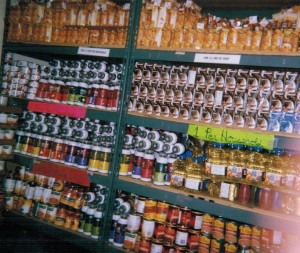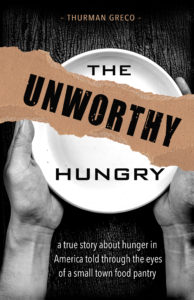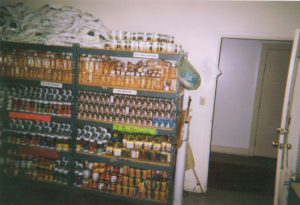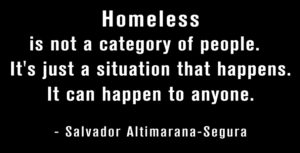Help the Homeless
The world of people who are homeless may seem very foreign – But, it’s actually very near. We meet people every day who are just like us, only they don’t have a roof over their heads.
We can all find ourselves without a roof when we lose a job. Or, maybe a spouse dies. Possibly an accident which leaves physical disabilities is the cause. In short, all it takes is a personal tragedy.
 There are many things we can do to help end homelessness. There are many, many things we can do to help those who are struggling with homelessness.
There are many things we can do to help end homelessness. There are many, many things we can do to help those who are struggling with homelessness.
One easy way we can help is to take a little extra food along when we go out of our home to work or on errands. A few extra sandwiches will help. When a person asks for change, offer him or her a sandwich.
A couple of times each year, gather the clothes you are no longer going to wear and donate them to shelters and pantries providing services to help those who are homeless.
While you gather clothes for the homeless, look at your family’s toys, books, and games and select those that are no longer being used. Children living in shelters have few possessions and will enjoy them.
Can you spare an hour or two? Tutors can make all the difference. Volunteer to tutor children in shelters.
Celebrate your birthday or anniversary and ask the people you invite to bring items for the homeless.
Carry fast food certificates with you when you are going out. Hand them out to people who are homeless.
Hold a food drive and take the food to a shelter or a pantry in your area.
Donate your collectable recyclable cans and bottles to people who are homeless. Donate a bag of groceries to a soup kitchen, shelter, or food pantry.
Volunteer at a food pantry or shelter.
Volunteer your professional services. Lawyers, doctors, psychiatrists, counselors, and dentists can all use your skills when you volunteer at a pantry or shelter.
Ask your company, church, school to host a fund-raising event for a pantry or homeless shelter. Items of dignity are really needed by the homeless.
 Thank you for reading this article!
Thank you for reading this article!
Please refer this article to your favorite social media network.
Thurman Greco
PS: The hunger book is really moving along. Things just never get finished as quickly as we all wish. Writing a book requires years and years of research and writing. In writing the hunger book, I have gone through thousands and thousands of sheets of paper and three computers. I have spent years and years getting this story moved from an event in my life to a book which will attract you or not in less than two minutes.
Whew!

SNAP
 SNAP is important. SNAP will help you if you are having trouble buying groceries.
SNAP is important. SNAP will help you if you are having trouble buying groceries.
SNAP is important for your community, too, because when you are able to get food with SNAP, you will have cash available to help pay your rent or buy gas to get back and forth to work.
Have you, or has someone you know, applied for SNAP? SNAP was formerly known as food stamps.. SNAP is about all that’s left in the way of assistance for people because welfare is shrinking and shrinking and shrinking yet again.
If you are having trouble paying for your groceries, now is a good time to apply. If you’ve applied in the past and were denied, maybe you need to apply again. You may, after all, have answered a question incompletely or incorrectly and were denied this benefit. Try again. You might do better this time around, especially if you or someone in your house is disabled or is a senior with medical expenses.
Some people are reluctant to apply for SNAP because they don’t know if they are eligible. Or, maybe they applied in the past but were denied. Many people don’t know how to apply and are overwhelmed by the application. Some people have never heard of SNAP and think of it as food stamps.
One thing: If you work, you need to know how to meet the work requirements.
Some information is needed to successfully apply for SNAP. This information comes in several categories.
Proof of income is necessary. This comes in the form of pay stubs, social security income information.
An identification is needed. This might be a State ID, passport, birth certificate, etc.
Bills help. This will include medical, heating, water, auto, rent.
Your social security number and the numbers of everyone in your household is necessary.
Dependent Care Costs will help. These include day care costs, child support, attendant for disabled adult.
Contact your local Department of Social Services office to arrange for application assistance. If this doesn’t work for you, contact your Office on Aging or Catholic Charities.
SNAP is an important benefit which will help you if you are having trouble buying groceries.
SNAP is important for your community, too, because when you are able to get food with stamps, you will have cash available to help pay your rent or buy gas to get back and forth to work.
SNAP is important for your household because you’ll be able to get more food with your SNAP card and you won’t be hungry anymore.
This translates to better health.
Thank you for reading this blog post.
Please share this article with your preferred social media network.
Please forward this article to anyone and everyone you know who might be able to have a better life with SNAP.
Thurman Greco
 This book is being published now and will be available soon!
This book is being published now and will be available soon!
 This book will be going to the publisher before the end of the year.
This book will be going to the publisher before the end of the year.
Take $1 – Leave $1
The young musician’s sign said it all:
TAKE $1
LEAVE $1
She sat on the sidewalk in front of Houst the other day, with her guitar box open. True to Woodstock tradition, she was singing for tips. Her sign, her posture, her music really resonated with me. I really feel that we are now fast approaching the point in our country where our residents are divided into two groups:
those who use pantries, soup kitchens
those who do not use pantries, soup kitchens
So, that puts us in the Take $1 – Leave $1 lifestyle.
Food pantries and soup kitchens, through the food distribution process work relentlessly to end hunger. Most people working in pantries or soup kitchens are volunteers who understand they offer hope and sustenance to a community of people living with and affected by hunger and, in some cases, homelessness.
Any amount you can spare will help make the pantry or soup kitchen you support a better place. Please send a donation today. Your gift will make a difference in the lives of people who have little and need a lot. Take $1 – Leave $1
Thank you in advance for your generosity.
Thurman Greco
Thank you for reading this blog. The story is true. The people are real.
Please refer this article to your preferred social media network.
Don’t forget to join the email list.
Tara Sanders Teaches Trauma Sensitive Yoga
Many people coming to a pantry or soup kitchen have given up on their stories. They’ve lost their voices. With trauma-sensitive yoga classes, they have an opportunity to change the stories themselves. They can add new chapters.
Tara Sanders, a Woodstock based yoga instructor, is the program director in the nonprofit Exhale to Inhale.
Exhale to Inhale yoga works to empower survivors of domestic violence and sexual assault to heal through yoga. Exhale to Inhale yoga guides women through postures, breathing, and meditation. Taught in trauma-sensitive style, practitioners are enabled to ground themselves in
their bodies
their strength
their stillness.
As this happens, they connect to themselves and work toward empowerment and worthiness. This practice can be transformational for survivors of sexual abuse and domestic violence when they shed the cloak of victimhood.
This is extremely important for people working and shopping in pantries because many survivors of domestic and sexual violence are found in these communities. The influence of this trauma is great. Add to this trauma another layer of
hunger,
unemployment,
underemployment,
homelessness,
serious illnesses to include mental illness
and you have a person who is finally voiceless.
Finally, the classes are free. Many attending these classes have absolutely no money at all.
Healers and body workers have long known that when the body is traumatized, the event is stored in the muscles.
Tara teaches the classes without music. She does not touch the students to correct a posture. Lights remain on throughout the class. These sessions offer survivors an opportunity to reclaim their lives through the healing and grounding of yoga.
Tara uses the yoga classes to help her students feel safe, strong, and in the present moment. As she teaches, she is a conduit for healing, and healthful programs in our community.
Exhale to Inhale is a New York-based nonprofit offering free weekly yoga classes to survivors of domestic and sexual assault. As an introduction to our area, Tara will teach free public yoga classes on Saturdays from 11 am to noon at the Center for Creative Education, 15 Railroad Ave, in Kingston.
After June 20, Exhale to Inhale yoga will be offered free of charge to women in area shelters.
Thanks for reading this blog.
Please send a comment.
Please refer this article to your preferred social media network.
Don’t forget to join the email list.
Thurman Greco
Round 2 in the Food Pantry World – Food, Sex, and Money
ARE YOU OLD ENOUGH TO REMEMBER HOW WE ACTED IN HIGH SCHOOL? Everyone in class knew the which students were acting right, following the rules, and those who were not. There was no privacy, really, and no secrets.
WELL, GUESS WHAT. The same mentality exists in food pantries. Everyone knows which pantries play by the rules and which ones don’t. There are no secrets.
FOR ONE THING, THE SHOPPERS CAN TELL BY WHAT KIND OF FOOD THEY’RE GETTING. Is the food on pantry day composed of bent cans, stale bread trimmed in green, and frozen food which has obviously been refrozen more than twice? If the answer to that question is “yes”, then it’s pretty obvious someone besides the shoppers is getting the fabulous produce, the wonderfully fresh Bread Alone Bread, and the quick frozen meats and veggies. It doesn’t take a rocket scientist to figure out the volunteers are taking it all for themselves and their neighbors.
PANTRIES COME EQUIPPED WITH GUIDELINES, AND RULES SIGNED OFF BY EXECUTIVE DIRECTORS AND COORDINATORS. The rules are clear.
PANTRIES COME EQUIPPED WITH COORDINATORS WHO ARE TAUGHT THE RULES . These coordinators are trained by, supervised by, and evaluated by the Food Bank. Boards,
Church Committees, and volunteers are often surprised to learn that Food Bank supervisors do expect certain levels of performance from coordinators.
Until now, the Food Bank was quiet about what was happening. Well, that attitude has changed.
IF YOU WORK IN A PANTRY THAT FORGOT THE RULES, or if you know about about a pantry with volunteers who forgot the rules, be prepared to expect a surprise or two in the coming months.
THE FOOD BANK HAS RULES. The rules have teeth. The Food Bank is no longer interested in keeping secrets. After all, our court system is pretty open. Misdemeanors and felonies are part of the public record.
Over the past few months, the Food Bank has terminated a few agency memberships. Why?
Volunteers:
sold Food Bank products for their own profit.
kept food for themselves or gave it to family and friends or other volunteers.
used products for unapproved activities.
forgot there are health standards and that pantries and pantry storerooms should be kept clean.
THANK YOU FOOD BANK. Those of us working in honest pantries have hoped this would happen. Personally, I feel that there are very few pantries operated by people who make up their rules as they go along and have no respect for the Food Bank. These people are, however, ruining the whole scene for all of us.
If you shop at or volunteer at a pantry where the rules are not followed, please call 1-518-786-3691 and report the issue.
On behalf of honest pantry volunteers and hungry shoppers everywhere, thank you for reading this blog/book.
Please share this article with your preferred social network.
Please send a comment.
Peace and food for all.
Thurman Greco
“Can I volunteer in your pantry tomorrow?”
 “If you’ve seen one homeless person, you’ve seen one homeless person.” – Thurman Greco
“If you’ve seen one homeless person, you’ve seen one homeless person.” – Thurman Greco
“Can I volunteer in your pantry tomorrow? I know about food and can help you.” The man standing before me was short and sturdy, with a gray pony tail…a typical homeless person if I ever saw one. He wore secondhand store denim and had not one ounce of extra weight on him. His boots and backpack were in good condition but definitely not new.
HIS REQUEST REEKED OF HUMBLE. This man had humble down sooo well. Humble is important when a person is homeless and mentally together. The police hassle homeless people so they learn skills to stay out of jail.
A very lose friend of mine, Paul Schmeltzer, once explained two important skills a homeless person needs: the ability to be humble and the ability to remember names and dates flawlessly. Paul could tell me what corner of what city he sat on at 2:15 in the afternoon on the last Friday in August, 2010. “These skills are necessary for a homeless person because if s/he can’t be humble and remember details, then jail time is in the near future”.
For those homeless with mental health issues, details like humble, coherency, an exacting memory are extremely challenging.
But, back to the story.
CAN YOU WORK IN MY PANTRY TOMORROW? How did you know all my volunteers have prior commitments tomorrow? I got excited! I’ve fed over 100 people by myself before, many times. But, volunteers help. Help is help. My pay grade is the absolute lowest in town.
“SURE,’ I SAID. “Love to have you. When you say you know food, what do you have in mind?”
“I’m a vegan. I know about produce. I’ll prep all your fresh food tomorrow.”
Sure, whatever that means. “Great. I’ll see you tomorrow. By the way, my name is Thurman.”
“And, I’m Arlen. Pleased to meet you, Thurman.” With that we shook hands and off he went.
The next day, Arlen walked into the pantry just as I finished stuffing two van loads of fresh produce into the tiny room. Pretty well gone was humble. In its place was a person who obviously knows and loves good quality food. He went to work.
First, he hauled all the boxes of produce back outside the building to the sidewalk where most of the pantry shoppers would wait to get into the building. Then, he arranged the food. Just. So. He made a workstation for himself as he assembled a large, black, heavy duty plastic bag for the inedible produce. A box turned upside down became a prep center, and the produce was neatly placed around him.
Starting with the carrots, he picked up a bunch, carefully removed the tops, then arranged them for shoppers to select from.
He divided bananas into 3 groups: rotten bananas to be discarded, bananas to be used for cooking, and those fresh enough to eat raw. And so he continued until he had prepped, graded, and arranged every fruit and vegetable delivered to the pantry in the vans that day. Arlen examined every leaf, stem, item in every box. He discarded the trash, he arranged all edible fruits and vegetables in gorgeous stacks.
Shoppers in the pantry that afternoon went home (to wherever or whatever that was) with perfect produce: no yellow leaves, no soft spots, no bruises, no tops. Everything was ready to prepare…just as if it had been bought in Gracie Balducci’s or Whole Foods. WOW.
Once, during the pantry food distribution, I quickly went outside the building to check on Arlen…just to see how things were going. “Buenas tardes, Senora. Cual frutas necessitas hoy?”
What? I heard Spanish! Arlen was speaking with a shopper in her native tongue. By the end of the pantry day, he spoke with shoppers in English, Spanish, French, Portuguese, Haitian, Italian, Creole. Arlen was entertaining everyone.
I knew I was going to be taken to the woodshed for allowing the food distribution at the entrance to the building but it was such a gift to the shoppers to receive this beautiful food and to speak their native tongues that I figured early on that I would take the anger and press on.
AND, I DID AND IT WAS WORTH IT. Every bit of it! Months later, they still hadn’t gotten over Arlen’s visit.
Actually, it was visits.
From that point on, whenever Arlen came to town, he worked in the pantry. He made us all feel we were special because our pantry was vegetarian.
Each homeless person is a special personality and has a special situation which s/he deals with.
So, how is Arlen homeless? Well, he moves around a lot and has a selection of friends who host him when he’s in the area. When Arlen arrives, there’s always a flurry of activity because he participates in all the events. Arlen assembled tents and kept the grounds clean when we had our first pantry music festival. .
When Holly Post, his Woodstock hostess, put her house on the market to move to Rosendale, Arlen was upset. “Holly’s got her house on the market and we’re moving to Rosendale” he said with feeling. Wherever Holly goes, Arlen is going too. I’m sure that, although Arlen will miss Woodstock, he and Rosendale will love each other.
Thank you for reading this book/blog.
Please refer this article to your preferred social media network.
Please send a comment.
Don’t forget to join the email list.
Peace and food for all.
Thurman Greco
The Homeless Visit the Food Pantry
“Homeless is not a category of people. It’s just a situation that happens. It can happen to anyone.” -Salvador Altamirano-Segura
In some respects, the homeless have problems just like you and me…
mental illness
physical disabilities
domestic violence
HIV issues
employment
underemployment
unemployment.
Finally, many are also veterans.
THEY JUST DON’T HAVE A ROOF OVER THEIR HEADS.
Homeless people, families come into pantries very quietly. They’ve lost their voice. The goal is to melt into the background, get food, and disappear.
There are reasons for this. They are often suffering from mental illness in addition to homelessness. Homelessness accompanies a number of mental illnesses including schizophrenia and bipolar disorder. Mentally ill persons have a tendency to become chronically homeless.
This can create an exception to the voiceless rule as the person communicates with beings unknown to the rest of us in tongue we don’t understand. One shopper at our pantry has been in another world since before I began working at the pantry.
According to MentalIllnessPolicy.org, there are over 250,000 seriously mentally ill homeless persons in our country. This statistic is very telling. What it says is there are more homeless people with untreated severe psychiatric illnesses than there are people receiving care for their diseases.
I see the sidewalks of whatever town or city I’m in as nothing more than wards for the untreated mentally ill. They mentally ill homeless suffer with all the day-to-day survival that all homeless have and, to top it all off, they’re sick.
THE HOMELESS HAVE SPECIAL NEEDS OVERLOOKED IN A PANTRY.
For starters, they have no address. This can be a real hindrance if a pantry bureaucracy requires such. In some communities in this area, several kind souls allow the homeless to use their location as a mail drop/address so they can receive the services they so desperately need and so they can register to vote.
Many pantry coordinators have no concept of the food needs of the homeless. Because the homeless have their kitchens in their shirt pockets, they food they use is very limited: protein/cereal bars, peanut butter, crackers, fresh fruits and vegetables to be eaten raw: blueberries, carrot sticks, celery, lemons, lettuce, limes, milk in pint containers, nuts, oranges, strawberries, sweet peppers, tomatoes.
ON BEHALF OF THE MANY HOMELESS IN OUR COUNTRY, I THANK YOU FOR READING THIS BLOG/BOOK.
Please share this article with your preferred social network.
Please send a comment.
Peace and food for all.
Thurman Greco
There Shouldn’t Even Be Pantries
There are sufficient resources in the world to ensure that no one, nowhere, at no time, should go hungry. – Ed Asner
THE CROWD WAS HEAVY THAT AFTERNOON, WITH THE HALLS PACKED.
People had begun to line up two hours early to shop in the pantry. Every poverty category was gathered outside the door: artists, crazy poor, disabled poor, elderly poor, employed poor, disabled poor, generational poor, hardworking poor, homebound, homeless, ill poor, mentally ill poor, messed-up poor, musicians, poets, newly poor, resource poor, struggling poor, transient poor, underemployed poor, unemployed poor, veterans, Woodstock’s colorful characters, writers. They got a three-day supply of food last week and by now it was all gone.
THE PANTRY ROOM OVERFLOWED WITH PRODUCE: oranges, lemons, carrots, potatoes, onions, eggs, Bread Alone breads, Bella Pasta, packs of organic salad mixes, fresh herbs, mushrooms. The list seemed endless.
The pantry opened promptly at 3:00 and by 3:02, there were four people already shopping in a line in the pantry room.
PRASIDA, RICH, GUY, TONY, AND ROBYN WERE AT THEIR STATIONS MOVING PEOPLE ALONG.
“Will the next two people in line please come into the pantry room now?”
“We’ve got room for another person here.”
“HEY TONY, HERE COMES ANOTHER BOX”. I was pitching freshly emptied boxes to Tony about every 2-3 minutes.
“How”‘s it going? Don’t forget to take a bag of carrots. We were able to get enough for everyone to take a bag.”
“Wait, wait, wait. What’s wrong? You’re crying. What happened?”
“Oh Thurman, I feel sooo ashamed. I was at the head of the line. Suddenly, a man walked in the door who wasn’t a shopper. He came right up to the line and spoke to us all: ‘There shouldn’t be any pantries. None of you should even be here in this building. All of you should go out and get jobs.’ “
“Thurman, you know I’m too old to work. Nobody hires people in their 70’s.”
“Listen Beverly, don’t even think about it. It was nothing.”
“OKAY EVERYONE, LET’S KEEP SHOPPING.” I SAID AS I WENT TO THE PANTRY DOOR AND CALLED TO GUY.
“What’s going on?”
” Thurman, a watcher came in and told everyone in the line that we should all go out and get jobs and that none of us should even be in the building. Everyone’s upset. But, we’re handling it.”
“Thanks’s Guy.”
“Here Tony, can you take a couple of extra boxes real fast?”
“Thanks.”
“WE CAN TAKE TWO MORE PEOPLE IN THE PANTRY.”
“Thanks for coming today. Be sure and take all the bread and salad you want. Don’t forget to go down to the barn for some frozen food. We’ve got some good deals down there today.”
“Welcome to the pantry today.”
“Let’s keep the line moving now.”
“TONY, CAN YOU TAKE SOME MORE BOXES?”
On behalf of all the people shopping and volunteering in the Good Neighbor Food Pantry that afternoon, I thank you from the bottom of my heart for reading this blog/book.
Please share this article with your preferred social media network.
Please send a comment.
Don’t forget to join the mailing list.
Peace and food for all.
Thurman Greco












